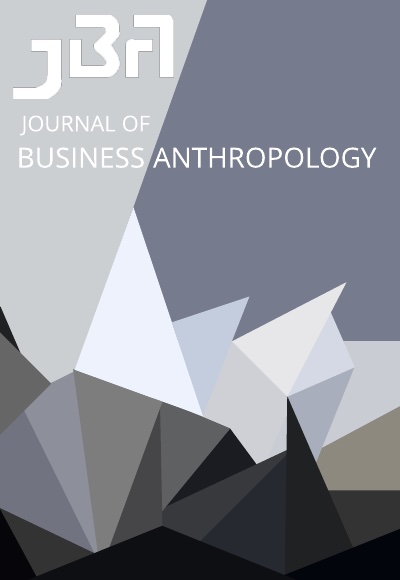“Prepared to Face the Unexpected”: Dynamic Enterprises in Italy as a Model of Resilience
DOI:
https://doi.org/10.22439/jba.v12i2.7089Abstract
Businesses that demonstrate organizational flexibility, characterized by dynamic problem-solving skills, in-house production processes, and a robust human capital, appear to be successful and resilient in times of crisis. Drawing on my fieldwork in medium-sized manufacturing companies in Emilia, Northern Italy, from June to November 2021, I investigate ideas and characteristics that shed light on good practices, key ingredients of the success of such companies, and possible future models of resilience. I employ participant observation and provide evidence taken from conversations or episodes observed, especially in one of the companies. Although greater structuring is often sought and considered the resolution of many existing problems, non-structuring is, at the same time, convenient in many circumstances. People are essential components in this dynamic organizational model, and their commitment in the organization goes far beyond contractual obligations. Their motivation stems from personal satisfaction as well as from a sense of responsibility and strong personal commitment.
References
Beinhocker, E. D. (1997). “Strategy at the Edge of Chaos.” McKinsey Quarterly 1: 25-39.
Bougleux, E. (2021). “Complesso-Controverso.” Riskelaboration II(1): 5-20.
Brozovic, D. (2018). “Strategic Flexibility: A Review of the Literature.” International Journal of Management Reviews 20(1): 3-31. https://doi.org/10.1111/ijmr.12111
Castells, M. (2000). “Toward a Sociology of the Network Society.” Contemporary Sociology 29(5): 693-699. https://doi.org/10.2307/2655234
Caulkins, D. D. and Jordan, A. T. (2012). A Companion to Organizational Anthropology. Hoboken, NJ: John Wiley & Sons. https://doi.org/10.1002/9781118325513
Denny, R. M. and Sunderland, P. L. (2016). Handbook of Anthropology in Business. New York: Routledge. https://doi.org/10.1201/9781315427850
Englehardt, C. S. and Simmons, P. R. (2002). “Organizational Flexibility for a Changing World.” Leadership & Organization Development Journal 23(3): 113-121. https://doi.org/10.1108/01437730210424057
Gambetta, D. (1988). Trust: Making and Breaking Cooperative Relations. Cambridge, MA: Basil Blackwell.
Garsten, C. and Nyqvist, A. (eds.) (2013). Organisational Anthropology: Doing Ethnography in and among Complex Organisations. London: Pluto Press.
Granovetter, M. (1985). “Economic Action and Social Structure: The Problem of Embeddedness.” American Journal of Sociology 91(3): 481-510. https://doi.org/10.1086/228311
Harvey, D. (1990). The Condition of Postmodernity: An Enquiry into the Origins of Cultural Change. Oxford: Blackwell.
Ingold, T. and Hallam, E. (2021). “Creativity and Cultural Improvisation: An Introduction.” In E. Hallam and T. Ingold (eds.), Creativity and Cultural Improvisation (pp. 1-24). New York: Routledge. https://doi.org/10.4324/9781003135531-1
Kirby, P. (2010). “Vulnerability and Globalization: The Social Impact of Globalization.” In B. S. Turner (ed.), The Routledge International Handbook of Globalization Studies (pp. 114-134). New York: Routledge.
Krause-Jensen, J. (2010). Flexible Firm: The Design of Culture at Bang & Olufsen. New York: Berghahn Books.
Moeran, B. (2014). The Business of Creativity: Toward an Anthropology of Worth. Oakland, CA: Left Coast Press.
Moeran, B. (2021). The Business of Ethnography: Strategic Exchanges, People and Organizations. New York: Routledge. https://doi.org/10.4324/9781003086918
Pagden, A. (1988). “The Deconstruction of Trust and its Economic Consequences in the Case of Eighteen-century Naples.” In D. Gambetta (ed.), Trust: Making and Breaking Cooperative Relations (pp. 127-142). Cambridge, MA: Basil Blackwell.
Papa, C. (1999). Antropologia dell'impresa. Milan: Guerrini scientifica.
Redini, V. (2008). Frontiere del "made in Italy": delocalizzazione produttiva e identità delle merci. Verona: Ombre corte.
Redini, V. (2021). “Oggetti, prodotti, merci.” In M. Mollona, C. Papa, V. Redini, and V. Siniscalchi (eds.), Antropologia delle imprese. Lavoro, reti, merci (pp. 157-195). Rome: Carocci Editore.
Sennett, R. (1998). The Corrosion of Character: The Personal Consequences of Work in the New Capitalism. New York: W.W. Norton & Company.
Sennett, R. (2007). The Culture of the New Capitalism. New Haven, CT: Yale University Press.
Sischarenco, E. (2019). Encountering Entrepreneurs: An Ethnography of the Construction Business in the North of Italy. Newcastle Upon Tyne: Cambridge Scholars Publishing.
Solomon, R. C. and Flores, F. (2003). Building Trust: In Business, Politics, Relationships, and Life. Oxford: Oxford University Press. https://doi.org/10.1093/0195161114.001.0001
Tetenbaum, T. J. (1998). “Shifting Paradigms: From Newton to Chaos.” Organizational Dynamics 26(4): 21-33. https://doi.org/10.1016/S0090-2616(98)90003-1
Yanagisako, S. J. (2002). Producing Culture and Capital: Family Firms in Italy. Princeton, NJ: Princeton University Press. https://doi.org/10.1515/9780691214221
Zinn, D. L. (2001). La raccomandazione: clientelismo vecchio e nuovo. Rome: Donzelli.
Downloads
Published
Issue
Section
License
Copyright (c) 2023 Elena Sischarenco

This work is licensed under a Creative Commons Attribution-NonCommercial-NoDerivatives 4.0 International License.
Authors who publish with this journal agree to the following terms:
- Authors retain copyright and grant the journal right of first publication with the work simultaneously licensed under a Creative Commons Attribution License that allows others to share the work with an acknowledgement of the work's authorship and initial publication in this journal.
- Authors are able to enter into separate, additional contractual arrangements for the non-exclusive distribution of the journal's published version of the work (e.g., post it to an institutional repository or publish it in a book), with an acknowledgement of its initial publication in this journal.
- Authors are permitted and encouraged to post their work online (e.g., in institutional repositories or on their website) prior to and during the submission process, as it can lead to productive exchanges, as well as earlier and greater citation of published work (See The Effect of Open Access).



